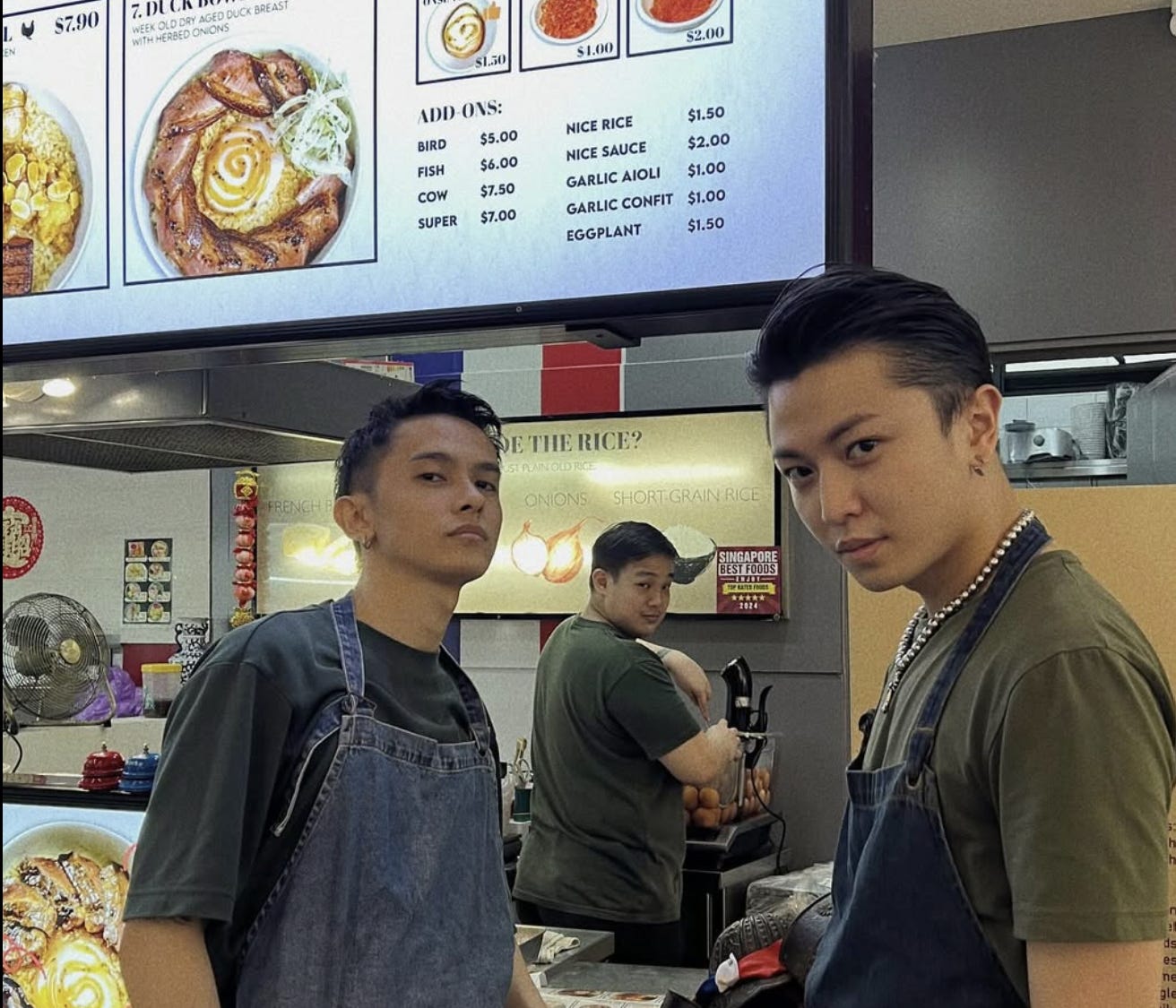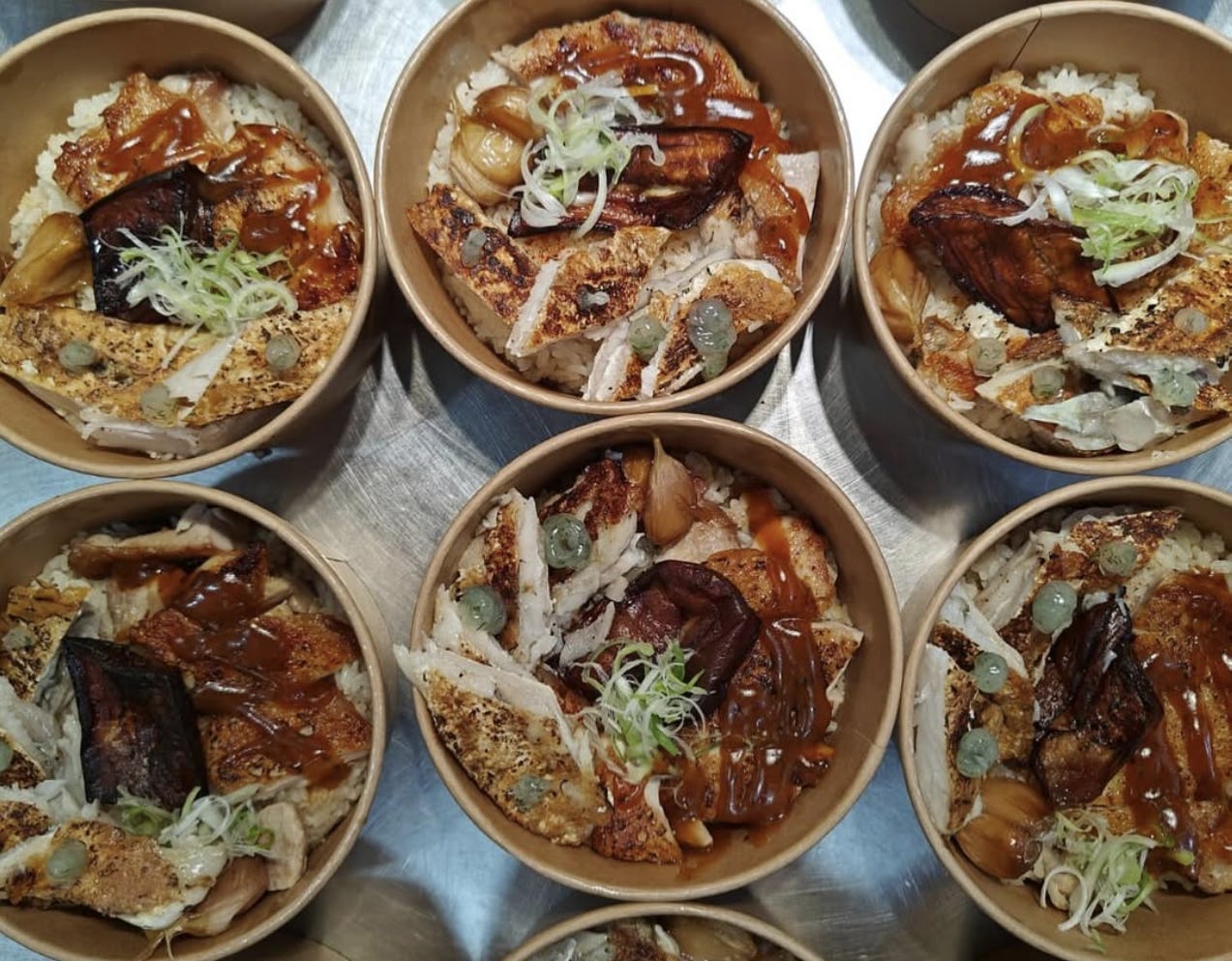Vibe-cooking a winning rice bowl: Mandel Ban's Nice Rice
How good feels and high standards took one Michelin-trained chef to hawker fame.
Mandel Ban did not set out to become king of grain bowls.
Fresh out of the Singapore Hotel Association Training and Education Centre (SHATEC), he spent years in Michelin-starred French establishment Bacchanalia - later rebranded as Vianney Massot - mastering sauces and precision plating. But all that changed after a highly successful popup at Almost Famous craft beer bar. The buzz around his rice bowls was real. People loved the concept.

That moment was the validation he needed to sink S$15,000 into a coffeeshop stall on French Road in 2021. It was a bet on low overhead, a lean team and pure instinct. After several twists and turns, Nice Rice is now a lunchcrowd favorite at China Square, where every bowl carries the quiet conviction of a chef who trusts his gut but never abandons method.
First Principles, Not Dogma
At first glance, Mandel’s kitchen resembles a workshop more than a hawker stall. Clear plastic tubs and metal containers line the shelves and counter, each with a designated purpose. Here, nothing is guesswork, even though Mandel will tell you that the whole menu grew “out of trial and error.”.
Both the space and the food are testaments to Mandel’s strong foundations working under Vianney Massot and later lessons learnt during his time with Wrap Bstrd and 8ASH. But at Nice Rice, Mandel asserts that he rewrites the rulebook. His sauces are not riffs on French or Japanese staples; they are built from scratch. Every sauce begins as a blank canvas: acids for background, a dash of umami or sweetness for body, and light saltiness as the finishing touch.
In practice however, that means painstakingly testing each batch of Taiwanese pearl rice in chicken stock made from real bones, no powder shortcuts. Singaporeans, Mandel claims, often wrestle with acidity and salt. “They can’t tell good food from ‘nice’ food,” he laughs. “They read a review and parrot it back.”
Every ingredient gets that treatment, even something as basic as onions. Mandel once timed himself peeling one in two seconds flat. “Why waste three extra seconds?” he asks. “Those seconds add up over a lunch rush.” Critics might call it neurotic, but Mandel swears that these little tweaks are what makes Nice Rice tick.
“Prep work is critical in [running Nice Rice], without good prep work the rest of the flow will crumble,” he reflects. Prepare well and service steadily hums along; let it slide, and everything else unravels.
Good prep work doesn’t necessarily mean following established practices. To Mandel, the way “things have always been done” should be taken to cautiously. “If an old-school cook claims to have a better method, others would have bought it and scaled it by now,” he insists.
Vibes Backed by Numbers
But Mandel never lets spreadsheets override good vibes. When rent increases or a renovation forces a temporary closure, he trusts his instincts as much as his ledger.

Case in point: after shock developments forced Nice Rice to relocate twice in two years, Mandel’s decision to take on the CBD lunch crowd came when a regular customer tipped him off to the new unit at China Square. Mandel checked the rent—about ten percent higher than AMK’s—and noted the stall was thirty percent smaller. He crunched the numbers: moving costs of around S$7,000 against more reliable CBD footfall.
“In the heartlands, my customers tend to come at odd hours and it makes scheduling prep work very difficult,” Mandel observed. In the CBD however, demand fluctuations were easier to predict. Nice Rice goes full throttle during lunchtime, and in the afternoons Mandel has time to also work on his private dining project. December to January also gives Mandel and his crew some respite from the everyday humdrum. That clarity also lets him forecast how much ingredients to prepare, minimizing food wastage and optimizing procurement.
That balance between precision and “the chills” also shaped Mandel’s R&D process. The core menu came together quickly. After that, every new dish was designed to complement the backbone, not overshadow it. He would carefully tweak sauce viscosity, noting customer reception as he went along. All of it balances his love of spontaneity with a professional’s eye for efficiency.
High Standards, Shared Success
For all his intensity, Mandel isn’t a lone genius.
His chefs fall under a strict regime; no part-timers are hired unless a big catering order hits. Training, he claims, is wasted on staff who won’t stick around - and on hires that don’t have the right aptitude. “If someone is stuck at 30%, that’s all the skill you’re going to get,” he claims.
In spite of his high standards, Mandel knows he doesn’t get it right all the time. In fact, he actively welcomes feedback from his crew. If a team member discovers a more efficient way to prepare the broth or slice ingredients, he readily implements it.

On the side, he hosts private-dining experiments. Some afternoons, he shuts the stall early to prepare tasting menus for small groups, pushing himself to “go crazy” with flavors. Those sessions remind him why he became a chef in the first place: to surprise people.
Mandel’s story feels classic: the professional chef who traded linen jackets for T-shirts and jeans. But it’s more than a trope. It’s a lesson in balance. He runs on instinct, but never ignores the data; he values tradition, yet he refuses to be bound by it. In Singapore’s hawker scene, where corners are cut and standards slip under cost pressures, he stands apart. Nice Rice is the product of a chef who insists on doing things his way—clear, efficient, and unmistakably delicious.

